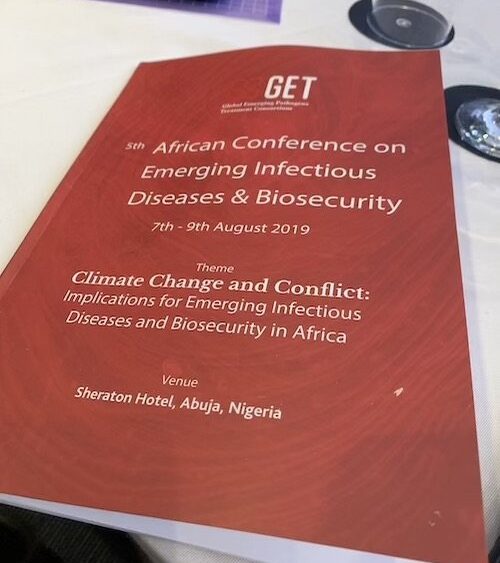All across the African continent, there’s an increasing frequency of infectious disease outbreaks like Ebola, Lassa fever, yellow fever, monkeypox, cholera, bird flu, and meningitis. How does climate change play a role? We spent two days this week answering that question.
From August 7th – 9th, the Global Emerging Pathogens Treatment (GET) Africa Consortium hosted their 5th Annual Conference on Emerging Infectious Disease and Biosecurity in Abuja. We attended the first 2 days of the 3 day event and our Managing Director Mrs. Niniola Williams presented on the second day.

This year’s theme was Climate Change and Conflict: Implications for Emerging Infectious Diseases and Biosecurity in Africa and speakers from all over the continent and other parts of the world converged to discuss and debate the impact of our changing climate on public health.
What aspects of climate change affect our health and the spread of infectious diseases? So many! But some of the most notable are:
- Changes in temperature and precipitation disturb the habitat, mating patterns, and migration of disease-carrying vectors such as mosquitoes and ticks
- Extreme precipitation and flooding lead to increased waterborne diseases such as cholera
- Increased drought increases the risk of foodborne illnesses
- Higher ambient temperatures increases the replication of foodborne pathogens such as salmonella and E. coli
- Rapid degradation of our environment in the form of deforestation means loss of habitat for animal species which leads to increased mixing with other animals as well as the human population
- Accumulation of toxins in our water tables and the atmosphere and shrinking natural resources (e.g. variable water supply and distribution which leads to competition and cross-border conflicts for water as seen with the issues around Lake Chad)

The bottom line is: Africa’s booming population, rapidly expanding megacities like Lagos, and ecosystem pressures are creating the perfect opportunities for climate change to further increase the risk of infectious diseases and biosecurity threats for the continent.
As Professor Akin Abayomi (Principal Investigator of GET) said on the first day of the conference, “Africa is a hotbed of infectious diseases.” And as a hotbed, we need to ensure African countries are prepared for the increased threats we will continue to face as a result of climate change.

Tim Reeves from the University of Melbourne noted, “Climate change will bring an added degree of difficulty to the already onerous task of biosecurity.” It’s clear we have a lot of work to do so we must keep collaborating to drive the solutions we need.

